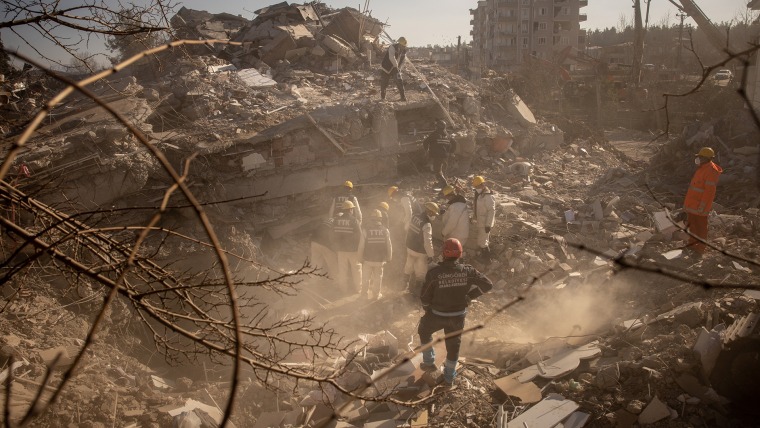The 7.8-magnitude earthquake that killed over 40,000 people and displaced millions in Turkey and Syria has renewed conversations about the U.S.- and European Union sanctions on Syria and left many wondering, including myself: to what end?
The harm these sanctions cause to ordinary Syrians has galvanized international demand to lift them in the wake of the earthquake, including by the Syrian Arab Red Crescent, one of the leading humanitarian organizations in the region. But hard-line critics of Syrian President Bashar al-Assad insist on maintaining any and all punitive measures.
Many analysts worry that the lifting of these sanctions won’t materially change much on the ground, nor do nearly enough.
Last week, the U.S. government announced a 180-day moratorium on sanctions to assist in relief efforts but — even as the sanctions already had exemptions for humanitarian assistance — many analysts worry that the lifting of these sanctions won’t materially change much on the ground, nor do nearly enough. For example, banks and private institutions are unwilling to send money to Syria in the form of much-needed remittances and other financial support out of fear of retribution. Then, there’s the fact that the vast majority of the country’s oil is controlled by the U.S.
There is no doubt that Assad has committed egregious human rights’ violations, but the story is never that simple. We are being myopic and simplistic if we convince ourselves that we can reduce what’s happening in Syria to a hero-villain or righteous-immoral narrative (and there is the question of the extent to which America has moral high ground to stand on). Sanctions are not resulting in the atomization of the Assad regime, they are only hurting and killing ordinary civilians. The only humane response the West can offer right now is to do everything in its power to allow, support and enable the flow of resources to the Syrian people.
“It’s time to put politics aside,” Syria expert and director of the Centre for Middle East Politics at the University of Oklahoma, Joshua Landis, said in an interview with Al Jazeera. “The United States has put very severe sanctions on Syria. It’s impossible to send money in to loved ones through banks. The United States controls all of Syrian oil, and that means the machines can’t run.”
The U.S. first imposed sanctions on Syria in 1979, when it was “designated a State Sponsor of Terrorism” by the Department of State. Subsequently, sanctions were further tightened under the Bush administration in 2004 and the Obama administration in 2011. Even more severe sanctions were introduced under the Trump administration — all of which heaped more devastation on ordinary Syrian civilians. Foreign Affairs rightly criticized Trump-era sanctions in an article entitled “The Pointless Cruelty of Trump’s New Syria Sanctions.”
In an Atlantic Council article published last month, prior to the earthquake, co-authors political economist Karam Shaar and humanitarian crisis analyst Said Dimashqi (a pseudonym given the sensitive nature of his work) argue that sanctions on Syria need to be re-evaluated precisely because they have demonstrated their inability to bring about their desired effect, while maximizing harm to ordinary Syrians. “[D]espite an expansive approach that targets entire economic sectors, these sanctions have had little to no effect in pushing the regime to offer political concessions, engage meaningfully in a peaceful settlement of the conflict, or improve its human rights record,” they write. “All the while, conditions in Syria have steadily worsened, as sanctions — along with the destructive effects of eleven years of conflict, the economic crisis in neighboring Lebanon, and the COVID-19 pandemic — have fueled an economic collapse that has left more than 90 percent of the population living in poverty.”
Sanctions on Syria need to be re-evaluated precisely because they have demonstrated their inability to bring about their desired effect, while maximizing harm to ordinary Syrians.
Currently, Assad insists on aid entering through and being distributed via the capital, Damascus. But as the area of the country devastated by the earthquake predominantly remains under opposition control, distribution of aid is limited. And it is precisely these types of constraints that make financial support in the form of remittances, for example, all the more imperative.
The Western media has been quick to paint a two-dimensional narrative, in which Assad is the villain and the West is exonerated for its role in worsening the crisis. For instance, portions of the subheading on a New York Times article was changed from “Syria is not able to receive direct aid from many countries because of sanctions” to “the Syrian government tightly controls what aid it lets into opposition-held areas” the following day, evincing the curation of editorial spin.
The only commonsense response to Syria is to, indeed, re-evaluate the West’s hard-line sanctions approach and to open up every channel possible for the flow of resources to ordinary Syrians and organizations doing work on the ground. The status quo has been largely inhumane and also just bad policy. Extreme poverty creates a breeding ground for extremism — if the West is not adequately motivated to change course because of the cruel ramifications of its policies, then this should be reason enough.

